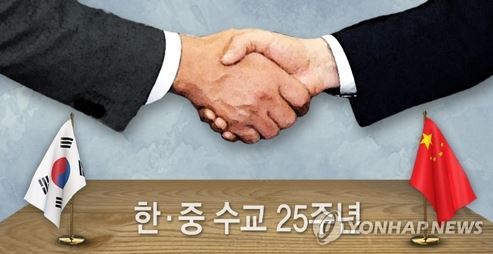Korea's economic dependence on China stirs worries about risks
By YonhapPublished : Aug. 18, 2017 - 14:33
South Korea's growing economic dependence on China has made it increasingly vulnerable to risks, including Beijing's retaliation for Seoul's decision to deploy a US anti-missile system and an economic downturn in the Chinese economy.
The dilemma over how to manage both economic and political relations with China is deepening 25 years after Seoul and Beijing established diplomatic relations.
According to data by the Korea International Trade Association, South Korea's exports to China, excluding Hong Kong, jumped to $124.4 billion last year, compared to $2.6 billion in 1992.
South Korea's imports of Chinese goods also surged to $86.9 billion last year from $3.7 billion in 1992.
Last year, South Korea posted a surplus of $37.5 billion in bilateral trade with China, accounting for about 42 percent of the total trade surplus.
The dilemma over how to manage both economic and political relations with China is deepening 25 years after Seoul and Beijing established diplomatic relations.
According to data by the Korea International Trade Association, South Korea's exports to China, excluding Hong Kong, jumped to $124.4 billion last year, compared to $2.6 billion in 1992.
South Korea's imports of Chinese goods also surged to $86.9 billion last year from $3.7 billion in 1992.
Last year, South Korea posted a surplus of $37.5 billion in bilateral trade with China, accounting for about 42 percent of the total trade surplus.

With South Korea became more economically dependent on China, Seoul is on the ropes when Beijing's political and economic risks heighten.
In January last year, a series of depreciations in the Chinese yuan sent shockwaves through the South Korean financial markets.
Some investors have been anxious about the slowing Chinese economy and the Chinese government's ability to control its mounting debt.
Last week, the International Monetary Fund warned that the Chinese economy was on a "dangerous" path over its debt load, advising Beijing to step up structural reforms.
The Chinese economy grew 6.7 percent last year, marking the slowest growth rate in 26 years.
As the Chinese economy cooled, so too would demand for intermediary goods, which account for a lion's share of South Korea's exports to China.
Park Chan-woo, a senior researcher at the KITA, said a growing dependence on China would bring more harm than gain to South Korea in the future.
"Focusing on China could lead to losses as China's protectionist moves strengthened and its competition with South Korea is intensifying," Park said.
Since November last year, when South Korea decided to deploy the US Terminal High Altitude Area Defense (THAAD) system, South Korean firms have reported difficulties in doing businesses with China.
The decision to host the THAAD battery is aimed at helping South Korea better protect against North Korea's nuclear and missile threats.
China, however, has long voiced concerns about the deployment of the THAAD system in South Korea, arguing that it could undermine its own national security interests.
In measures perceived to have been taken in retaliation for the deployment of the THAAD battery in South Korea, China banned its travel agencies from selling group tours to South Korea and closed dozens of Lotte retail stores in the mainland following inspections.
Sales of Hyundai Motor Co. cars plummeted in China and a number of non-tariff trade barriers against South Korean goods have been reported, with China's state-controlled media calling for a boycott of South Korean goods.
According to a survey released in April this year, South Korean companies doing business in China said their business conditions hit an all-time low over the diplomatic row.
The business sentiment index of 218 local companies' assessment on business climate and prospects in China fell to 48 in the first quarter of the year, according to the survey by the Beijing unit of the Korea Chamber of Commerce and Industry.
A reading below 100 means the number of companies forecasting business conditions will deteriorate beat those expecting an improvement.
Business tycoons raised the issue of retaliatory actions by China when they met with President Moon Jae-in last month.
Shinsegae Vice Chairman Chung Yong-jin told Moon that Chinese tour groups have not shown up at Shinsegae's duty-free stores as the number of Chinese tourists has plunged.
LG Group Vice Chairman Koo Bon-joon also noted the difficulty of doing business in China, saying the Chinese government has rejected buying South Korean batteries for electric cars.
"China bans South Korean firms from entering into (the Chinese market) to nurture its own batteries," Koo said.
Experts said South Korean officials should talk tougher and lodge complaints with international bodies against China's hostile campaign on trade.
Han Jae-in, an analyst at Hyundai Research Institute, said, "There have been some cases that we didn’t notify the World Trade Organization of China's irrational non-tariff measures. In these cases, we must raise our voice." (Yonhap)






![[KH Explains] How should Korea adjust its trade defenses against Chinese EVs?](http://res.heraldm.com/phpwas/restmb_idxmake.php?idx=644&simg=/content/image/2024/04/15/20240415050562_0.jpg&u=20240415144419)












![[Today’s K-pop] Stray Kids to return soon: report](http://res.heraldm.com/phpwas/restmb_idxmake.php?idx=642&simg=/content/image/2024/04/16/20240416050713_0.jpg&u=)